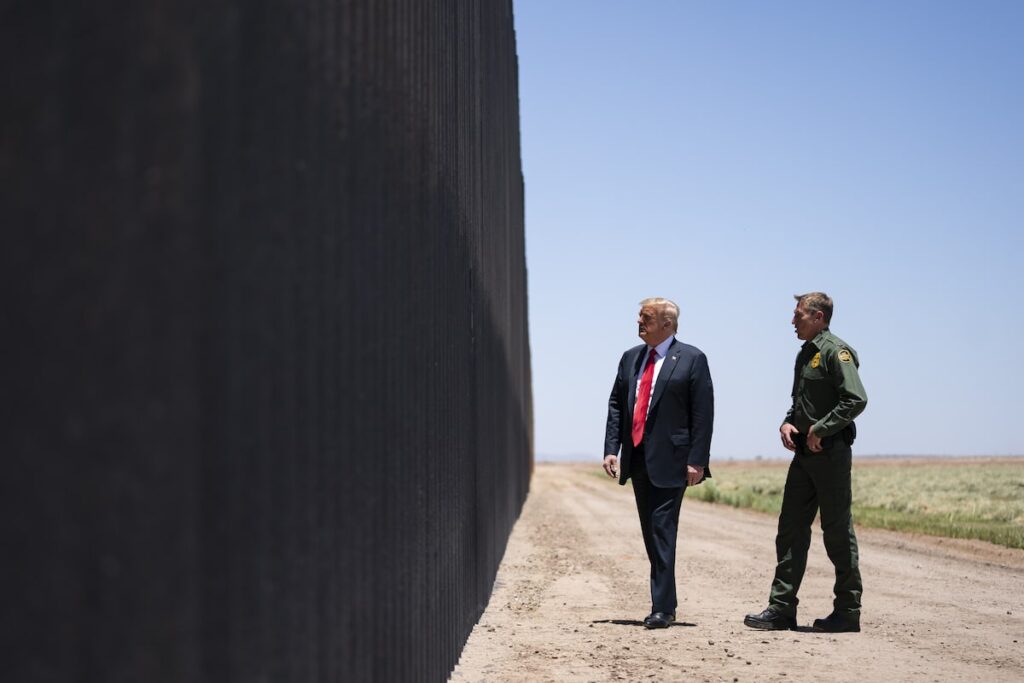Open this photo in gallery:
U.S. Border Patrol Chief Rodney Scott gives President Donald Trump a tour of a section of the border wall in San Luis, Arizona, Tuesday, June 23, 2020. Evan Vucci/The Associated Press
Polls suggest that Donald Trump has more than a 50% chance of winning the US presidential election on November 5. This will pose significant challenges for Canada in areas ranging from trade to defence to immigration.
When it comes to immigration, thinner borders, not thicker ones, may be the best solution. Here's why.
Trump and his allies have threatened to use law enforcement officers, the National Guard and possibly active-duty military to round up an estimated 11 million illegal immigrants, hold them in detention camps and then deport them.
“Trump will use the vast powers of the federal government to carry out the most sweeping immigration crackdown ever,” Trump adviser Stephen Miller told The New York Times.
The Trump administration's first attempts to deport illegal immigrants caused fear and suffering, but many of the efforts were thwarted by judicial decisions.
But the conservative think tank Heritage Foundation and other groups are hard at work developing policies a second Trump administration could implement to enable mass deportations, including identifying loyalists who could fill key positions to carry out those policies.
It would have broad public support: A CBS/YouGov poll released this month found that 62% of registered voters and 53% of Hispanics support “a new national program to deport all illegal immigrants currently in the United States illegally.” (The poll, conducted June 5-7, surveyed 1,615 registered voters and has a margin of error of 3.8 percentage points.)
There are legal and practical constraints that would prevent a second Trump administration from implementing such a plan, and the American Civil Liberties Union and others would likely challenge the proposed measures in court.
Even if the administration were to secure the approval of Trump-appointed judges, there simply aren't enough judges, law enforcement officers and civil servants to process and deport such large numbers of people.
“I'm not convinced that this policy is meaningfully implementable,” Audrey Macklin, a law professor at the University of Toronto who specializes in immigration and human rights law, said in an interview.
Still, “if we can create enough uncertainty about what's going to happen, it could trigger fear and anxiety that will cause some people to take action to protect themselves and their families.”
This could lead to illegal immigrants leaving the US for Canada.
The latest version of the Safe Third Country agreement stipulates that asylum seekers who enter Canada from anywhere along the border must be returned to the US, but Professor Maclin believes this will not reduce the influx of asylum seekers – it will only put them at risk by trying to cross clandestinely and dangerous water or land routes.
And “this will be an employment stimulus for smugglers,” she predicted.
Both Macklin and Jamie Chai Yun Liu, a law professor at the University of Ottawa and an authority on immigration and refugee issues, believe a better solution would be to restore the opportunity for asylum seekers to use official ports of entry and begin their asylum claims there, regardless of safe third country agreements.
A large influx of migrants seeking asylum across the border from the US could undermine public confidence in Canada's immigration system, but Liu says public confidence depends not on how many people enter Canada, but on whether they are properly supervised.
Many Canadians have opposed the recent unexpected influx of international students and the thousands of asylum seekers who have used the irregular border crossing at Wroxham Road, but there is broad public support for a program to admit thousands of Syrian and Ukrainian refugees.
“The Cabinet has an obligation to consider whether the third country security agreement should continue under circumstances that would arise if President Trump is re-elected,” Professor Liu told me.
Either way, Trump may choose to welcome illegal immigrants across the northern border and revoke the agreement himself.
If Trump wins, Canada will need to be prepared to welcome as many newcomers from the United States as possible, regardless of their immigration or citizenship status.
These are some of the silver linings in the very dark storm cloud that is a second term for President Trump.



